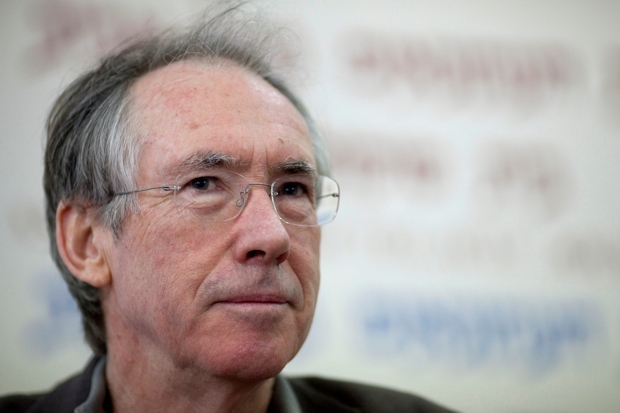He has recanted! The blasphemer, the thoughtless pricker of moral orthodoxy, has backtracked! Rejoice!
Yes, novelist Ian McEwan, who had the temerity to question the transgender ideology has now clarified his comments. He has declared that transgenderism is actually something to be ‘respected and celebrated’. He has seen the light. He has been corrected. He has ‘acknowledged the hurt’ he caused, says Stonewall, by which it means his foul mind has been given a moral spring-clean. If you want to see what illiberal times we live in, and how profoundly punishing the politics of identity can be, look no further than this mad McEwan story. His sin was to have raised a couple of questions about trans stuff during a talk at the Royal Institution last week. He said identity politics is becoming increasingly consumerist, where individuals pluck a readymade ‘self’ from ‘the shelves of a personal-identity supermarket’. And then he committed the mind-crime of the century, saying: ‘For example, some men in full possession of a penis are identifying as women and demanding entry to women-only colleges, and the right to change in women’s dressing rooms.’ Challenged by an audience member over these heretical utterances, McEwan said: ‘Call me old-fashioned, but I tend to think of people with penises as men.’ Bad move, Ian. As predictably as night follows day, and a Change.org petition follows a Katie Hopkins column, his comments elicited spittle and fury and demands for retractions from the trans movement and its ‘allies’ (which basically means tragic people on Twitter with nothing better to do than Google for people who have misgendered Caitlyn Jenner and send them 140-character missives about what evil transphobes they are). Stonewall got stuck in, slamming McEwan for his ‘uninformed views’ and claiming his argument doesn’t only ‘denigrate the trans experience — it denies its very existence’. Five hundred years ago if you denied the existence of God you’d have been publicly humiliated; today denying the existence of penis-bearing women will land you in hot water. Peter Tatchell accused McEwan of ‘ethical authoritarianism’. Twitter, of course, went into meltdown, but then that is its natural state. McEwan is weird, ignorant, a bigot, the Twits said, fancying themselves as good liberals when in fact a few centuries back they’d have been at the front of torch-wielding mobs against godless and eccentric misspeakers. The slurs and bitching worked. In today’s Guardian, McEwan has written an open letter in which he partly criticises his critics for being ‘righteous and cross’, but also effectively bends his knee before the trans religion. He says transgenderism ‘should be respected’, and then repeats the central mantra of the trans lobby: ‘Biology is not always destiny.’ Having questioned the trans movement just a week ago, McEwan now repeats its key credo. The moral shaming of McEwan is highly disturbing. It shows how unhinged the politics of identity has become. Identity is now utterly unanchored from objective reality. All that matters is how one self-identifies. If a big bloke with stubble, a penis and a penchant for boob tubes says he is a woman, then he’s a woman. Instantly. Magically. Mysteriously. In law, even, if that’s what he — sorry, she — wants.The swirling subjectivity of identity-creation has gone so far that anyone who still talks about objective or biological facts, anyone who says a person with a penis is a man, is treated as a thought-criminal. The McEwan madness confirms the suffocating censoriousness of the 21st century, the way that anyone who raises a peep about trans stuff or multiculturalism or climate change or any other sacred creed of the new elite can be branded a denier or a bigot and be forced to recant. This is really bad. It encourages self-censorship and nurtures a culture of intellectual caution that hurts public life.







Comments